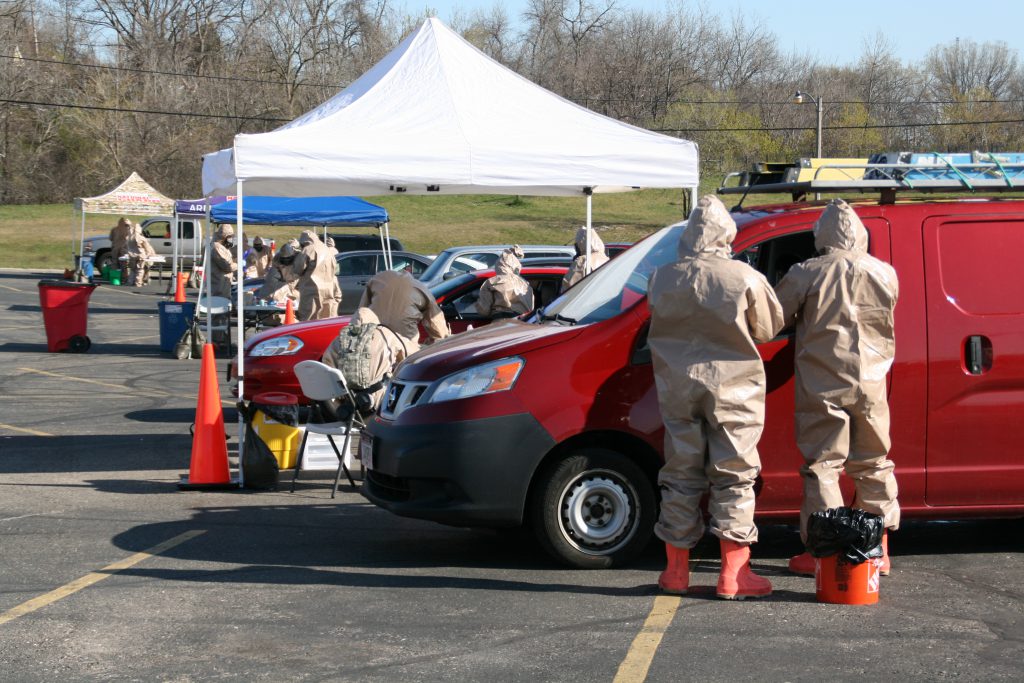Are Local “Safer at Home” Orders Legal?
Kenosha and Brown counties drop theirs, while Mayor Barrett stands by city's, says politics at play.

Wisconsin National Guard assist individuals in performing COVID-19 specimen collections at a drive-thru testing site. Photo by Jeramey Jannene.
The fallout from the Wisconsin Supreme Court‘s 4-3 decision to void the state’s Safer at Home order continues.
Brown and Kenosha counties, which have the first and fourth greatest per-capita COVID-19 outbreaks, have reversed course and revoked their local orders maintaining practices similar to the state “Safer at Home” order. Both cited legal advice that the order wasn’t enforceable and wouldn’t hold up in court, but there were no lawsuits filed against either order.
“Tonight, with varying guidance from the Wisconsin Counties Association and more time to review best practices moving forward, together we’ve determined that we will withdraw our order and instead view Safer-at Home as a series of best practices, rather than requirements,” wrote Kenosha County Corporation Counsel Joseph Cardamone on Thursday evening.
WCA says no formal opinion was rendered. “Wisconsin Counties Association has made no statement on the legality of local public health orders and has issued no formal guidance on such,” said the organization in a statement.
But that didn’t stop Brown County from pulling out. “Based on research conducted during the last 24 hours, and on consultations with outside legal counsel, Brown County Corporation Counsel is now of the opinion that the legal basis for the Order is likely not strong enough to withstand legal challenge,” said the Brown County Public Health Division in a statement.
Milwaukee Mayor Tom Barrett, an attorney, is confident in his city’s order, which is similar to one issued by the 18 Milwaukee County communities. “I am confident of [its legality], we worked very closely with the City Attorney’s office,” said Barrett during a media briefing Friday afternoon.
“Consulting with our City Attorney, we are very confident we have strong legal underpinnings for the actions we are taking,” he added during a second Friday press briefing.
But shortly after Barrett made his first comments, Cudahy Mayor Tom Pavlic instructed public health officer Katie Lepak to pull out of the joint Milwaukee County order governing the 18 suburban communities. “We’ve determined that we will withdraw our order and instead rely on guidance and recommendations, rather than requirements,” said Pavlic in a statement.
The decisions are technically issued by the local health officer, not the elected executive, but in almost every case that health officer is an appointee of the elected executive. Pavlic had previously barred Lepak from talking to the press about the size of the outbreak at the Smithfield Foods plant in Cudahy.
On Thursday afternoon Governor Tony Evers and Palm said they would work with communities on crafting local orders. “We will continue to have those conversations with local jurisdictions,” said Palm before the counties and municipalities began pulling out.
Republican Assembly Majority Leader Robin Vos also backed local control over the matter on Thursday. “As a Republican, I believe in local control,” said Vos. The Legislature had brought the suit that overturned the statewide order and Vos has talked of wanting a regional approach.
Evers, not knowing counties would opt in and out within 24 hours, offered a prediction Thursday. “Things are going to get very confusing very fast,” he said. And here we are.
“I am not naive enough to believe that there is no politics here,” said Barrett. “You can see communities clearly making decisions driven by political considerations.”
“Folks the Supreme Court might have changed the rules for how we operate, but it sure as hell didn’t change the rules for how viruses operate,” said Evers.
If you think stories like this are important, become a member of Urban Milwaukee and help support real, independent journalism. Plus you get some cool added benefits.



















“Republican Assembly Majority Leader Robin Vos also backed local control over the matter on Thursday. ”As a Republican, I believe in local control,’ said Vos.”
Except, that is, when a municipality wants to do something that WMC or other contributors to our campaign funds don’t want them to do. Like, for example, banning plastic grocery bags. Local control goes out the window then, because that’s best for us Republicans.
Wisconsin’s bar scene in the aftermath of Wednesday’s State Supreme Court ruling is spreading COVID as surely as Mardi Gras did in New Orleans. (About a month after Mardi Gras, New Orleans woke up to find that COVID was out of control; until it shut down, New Orleans became the world’s fastest-growing COVID hotspot.)
While many more revelers packed Bourbon Street than any single Wisconsin bar, there are lots of crowded Wisconsin bars. And Mardi Gras had two factors limiting COVID spread—(1) it was only one day so nobody who caught it there had time to spread it to others before Ash Wednesday and (2) it was outdoors.
I fear for the state of Wisconsin’s hospitals come mid- to late-June!